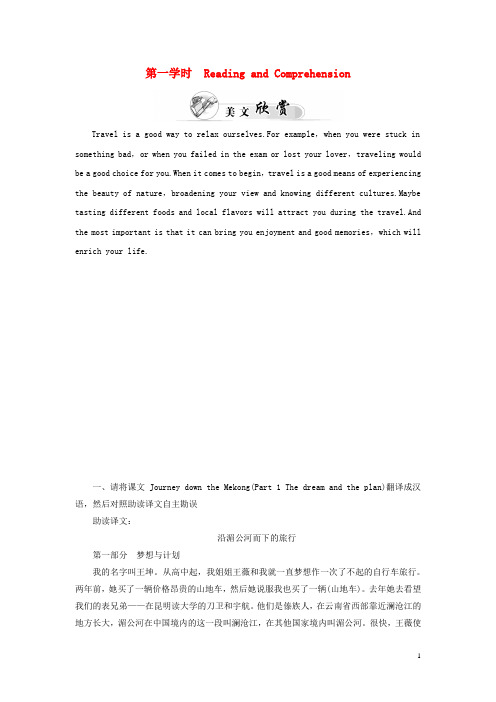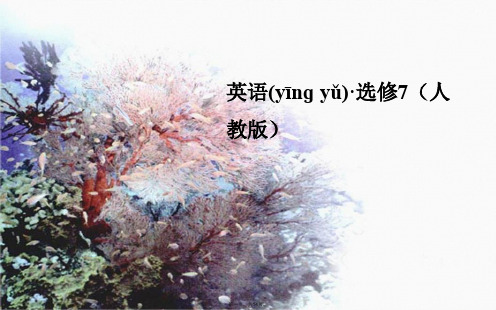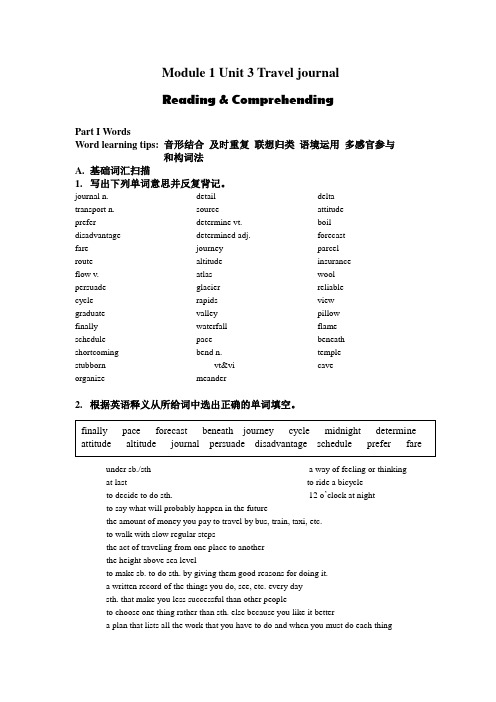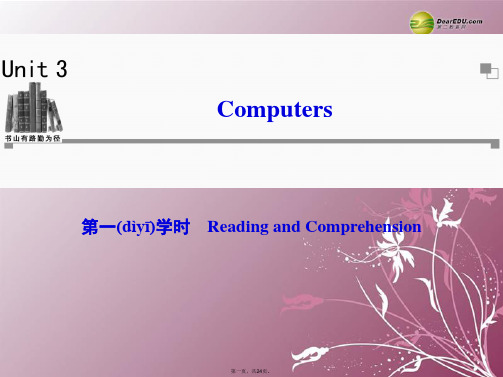高中英语 unit3 第一学时 reading and comprehension同步检测(含解析)新人教版必修2
- 格式:doc
- 大小:265.50 KB
- 文档页数:2

单元(章精美句子1、善思则能“从无字句处读书”。
读沙漠,读出了它坦荡豪放的胸怀;读太阳,读出了它普照万物的无私;读春雨,读出了它润物无声的柔情。
读大海,读出了它气势磅礴的豪情。
读石灰,读出了它粉身碎骨不变色的清白。
2、幸福幸福是“临行密密缝,意恐迟迟归”的牵挂;幸福是“春种一粒粟,秋收千颗子”的收获. 幸福是“采菊东篱下,悠然见南山”的闲适;幸福是“奇闻共欣赏,疑义相与析”的愉悦。
幸福是“随风潜入夜,润物细无声”的奉献;幸福是“夜来风雨声,花落知多少”的恬淡。
幸福是“零落成泥碾作尘,只有香如故”的圣洁。
幸福是“壮志饥餐胡虏肉,笑谈渴饮匈奴血”的豪壮。
幸福是“先天下之忧而忧,后天下之乐而乐”的胸怀。
幸福是“人生自古谁无死,留取丹心照汗青”的气节。
3、大自然的语言丰富多彩:从秋叶的飘零中,我们读出了季节的变换;从归雁的行列中,我读出了集体的力量;从冰雪的消融中,我们读出了春天的脚步;从穿石的滴水中,我们读出了坚持的可贵;从蜂蜜的浓香中,我们读出了勤劳的甜美。
4、成功与失败种子,如果害怕埋没,那它永远不能发芽。
鲜花,如果害怕凋谢,那它永远不能开放。
矿石,如果害怕焚烧(熔炉),那它永远不能成钢(炼成金子)。
蜡烛,如果害怕熄灭(燃烧),那它永远不能发光。
航船,如果害怕风浪,那它永远不能到达彼岸。
5、墙角的花,当你孤芳自赏时,天地便小了。
井底的蛙,当你自我欢唱时,视野便窄了。
笼中的鸟,当你安于供养时,自由便没了。
山中的石!当你背靠群峰时,意志就坚了。
水中的萍!当你随波逐流后,根基就没了。
空中的鸟!当你展翅蓝天中,宇宙就大了。
空中的雁!当你离开队伍时,危险就大了。
地下的煤!你燃烧自己后,贡献就大了6、朋友是什么?朋友是快乐日子里的一把吉它,尽情地为你弹奏生活的愉悦;朋友是忧伤日子里的一股春风,轻轻地为你拂去心中的愁云。
朋友是成功道路上的一位良师,热情的将你引向阳光的地带;朋友是失败苦闷中的一盏明灯,默默地为你驱赶心灵的阴霾。

第一学时Reading and ComprehensionTravel is a good way to relax ourselves.For example,when you were stuck in something bad,or when you failed in the exam or lost your lover,traveling would be a good choice for you.When it comes to begin,travel is a good means of experiencing the beauty of nature,broadening your view and knowing different cultures.Maybe tasting different foods and local flavors will attract you during the travel.And the most important is that it can bring you enjoyment and good memories,which will enrich your life.一、请将课文Journey down the Mekong(Part 1 The dream and the plan)翻译成汉语,然后对照助读译文自主勘误助读译文:沿湄公河而下的旅行第一部分梦想与计划我的名字叫王坤。
从高中起,我姐姐王薇和我就一直梦想作一次了不起的自行车旅行。
两年前,她买了一辆价格昂贵的山地车,然后她说服我也买了一辆(山地车)。
去年她去看望我们的表兄弟——在昆明读大学的刀卫和宇航。
他们是傣族人,在云南省西部靠近澜沧江的地方长大,湄公河在中国境内的这一段叫澜沧江,在其他国家境内叫湄公河。
很快,王薇使他们也对骑车旅行产生了兴趣。
大学毕业后,我们终于有了作一次骑车旅行的机会。

最新教学资料·人教版英语Unit1 Warming up,Pre-reading,Reading and Comprehending参考教案Period 1&2Teaching Goals:1. To arouse Ss’ interest in learning about the festivals around the world.2. To improve Ss’ listening ability.3. To train Ss’ speaking ability.Teaching Procedures:Step 1. Leading-inPurpose: To activate Ss and arouse them to express their opinions about a festival. Lead Ss to the content of this unit. Teacher may say, “Do you know what is called the Christmas of China? The Spring Festival. Yes. The oldest and most important festival in China is the Spring Festival. Each country and each nation has its own festivals. Today we are going to learn something about the different festivals.”Step 2. Warming Up1. Ask Ss to turn to P1 and work in groups to complete the form on P1.2. Ask Ss to discuss festivals they have filled in the form and their importance to the society. After that, ask Ss to present their opinions to all classmates.Step 3. Pre-listeningPurpose: To help Ss learn about the context of the Listening text.Ask Ss to talk about the following questions to get them prepared to listen to the reading text.1. How many ancient festivals do you know?2. Are foreign festivals different from Chinese festivals? In what part?Step 4. ListeningPurpose: To get the main information in the listening part.To develop Ss’ listening abilityTo learn some information about the festivals around the world.Ask Ss to listen to the tape, focus on the subjects mentioned in the passage and thenanswer the following question.How many kinds of festivals were mentioned in the text?Suggested Answer: Five.What are they?Suggested Answer:Ancient FestivalsFestivals of the DeadFestivals to Honor PeopleHarvest FestivalsSpring FestivalsStep 5. Pre- readingDivide Ss into groups of four and ask them to discuss the following questions.1. What’s your favorite holiday of the year? Why?2. What festivals or celebrations do you enjoy in your city or town? Do you like spending festivals with your family or with friends? What part of a festival do you like best---the music, the things to see, the visits or the food?Step 6. Fast readingAsk Ss to read the text quickly and answer the following questions.1. What are festivals of the dead usually for?2. What make autumn festivals happy events?3. What do people usually do at spring festivals?4. What is one important reason to have festivals and celebrations?5. Compare the festivals of the dead in Mexico, Japan and China. What things are similar? What things are different?Suggested Answers:1. Festivals of the dead are for honoring or satisfying dead ancestors or others, who some people believe might return to help or harm living people.2. Autumn festivals are happy events because people are thankful that food is ready for winter and the hard farm work is finished.3. At spring festivals, people usually have dances, carnivals and other activities tocelebrate the end of winter and the coming of spring.4. It is important to have festivals and celebrations so we can enjoy life / be proud of our customs / forget our work for a little while.5. The Chinese, Japanese and Mexican festivals of the dead all have customs to honour the dead. The Chinese and Japanese go to clean their ancestors’ graves, and the Mexican offer food, flowers and gifts to the dead. However, there are some differences. The Mexicans eat special food that looks like bones, something the Chinese and Japanese do not do.Step 7. Intensive reading1. Ask Ss to read the text carefully and sum up the main idea of each part.2. Discuss in pairs which festivals you think are the most important and which are the most fun. Then fill in the chart with your ideas.Suggested Answer:Various answers are acceptable.3. Ask Ss the following question and encourage Ss to give some similarities that they think festivals have, and give their reasons. Then invites Ss to tell the similarities and then ask them to present them before the class.What similarities can you find among these festivals?Suggested Answer:They most include food, music or entertainment, like dances, light or fire.They are most together with family and friends.Festivals exist everywhere.Many of them celebrate similar ideas and important cultural events or remember event of people.Human beings need to have things in life to celebrate and have a break from daily struggles and demands.Step 8. HomeworkPurpose: To get a further understanding of the text.1. Ask Ss to continue discussing their opinions about festivals with their partners.2. Ask Ss to read the text once again and try to retell the text.3. Ask Ss to discover useful words and expressions in the text.。


Module 1 Unit 3 Travel journalReading & ComprehendingPart I WordsWord learning tips: 音形结合及时重复联想归类语境运用多感官参与和构词法A.基础词汇扫描1.写出下列单词意思并反复背记。
journal n. _________ transport n. __________ prefer __________ disadvantage _________ fare ___________ route ___________ flow v. ___________ persuade ___________ cycle ___________ graduate ___________ finally ___________ schedule ___________ shortcoming __________ stubborn __________ organize __________ detail ___________source ___________determine vt. _________determined adj. _______journey ___________altitude ___________atlas __________glacier ___________rapids ___________valley __________waterfall __________pace ___________bend n. ___________vt&vi __________meander ___________delta ___________attitude ___________boil ___________forecast ___________parcel ___________insurance ___________wool ___________reliable ___________view ___________pillow __________flame ___________beneath ___________temple ___________cave ___________2.根据英语释义从所给词中选出正确的单词填空。

第一学时Reading and Comprehension
Laptop Computers in School
Computers are popular all over the world,especially laptop computers.People use them on trains and airplanes,in airports and hotels.These laptops connect people to their workplace. In the United States today,laptops also connect students to their classrooms.
As laptops become more powerful,they become more similar to desktop computers.In addition,the portable computers can connect students to not only the Internet,but also libraries and other resources.State highereducation officials are studying how laptops can help students.State officials are testing laptop programmes at other universities,too.At Westlake College,more than 60 percent of the staff use computers.The laptops will allow all teachers to use computers in their lessons.
一、请将课文Who Am I?翻译成汉语,然后对照译文助读自主勘误
译文助读:
我是谁?
经过一段时间我已经被改变了很多。
1642年我在法国诞生时是一台计算机器。
尽管当时我还年轻,但是我能简化一些复杂的数学题。
我发育缓慢,差不多到了两百年之后,查尔斯·巴比奇才把我制成了一台分析机。
在操作员用穿卡孔为我设计程序后,我能够进行逻辑“思考”,并且能够比任何人更快地算出答案。
那时这被当作是一次技术革命,也是我“人工智能”的开始。
在1936年,我真正的父亲艾伦·图灵写了一本书,讲述了怎样使我成为一台“通用机器”来解决任何数学难题。
从那时起,我在体积和脑容量方面迅速成长。
到20世纪40年代,我已经长得像一间屋子那么大,我不知道是否还会长得更大。
但是,这个现实也使得我的设计者很担心。
随着时间的推移,我被弄得越来越小。
自20世纪70年代以来,我一直被用在办公室和家庭里,先是用作个人电脑,后来又做成便携式。
这些变化只有随着我的存储能力的不断提高才能成为可能。
最初是被存储到电子管中,之后是晶体管上,后来是非常小的芯片上。
因此,我已经完全改变了我的形状。
随着我年龄越来越大,我也变得越来越小。
随着时间的推移,我的记忆能力发展得如此之快,就像一头大象一样,从来不会忘记告诉我的任何事情!我的存储容量变得如此巨大,连我自己都不能相信!但是我总是孤孤单单地站在那里,直到20世纪60年代初,人们才给了我一个用网络联成的家庭。
我能够通过万维网和其他人分享我的知识。
从20世纪70年代起,我又被开发出了很多新的用途。
我在通信、金融和商业领域变得非常重要。
我还被放在机器人里面,被用来制作移动手机,并且用来帮助做医疗手术。
我还被放
置在航空火箭里去探测月球和火星。
不管怎样,我的目标是给人类提供高质量的生活。
现在我充满了幸福感,因为我是人类忠实的朋友并时时给他们提供帮助。
二、课文精选段落背诵,请注意意群、连读和升降调
Since the 1970s /many new applications have been found for me. ↘/ I have become very important ⌒in communication,finance / and trade. / I have also ↗been put⌒ in robots and used⌒ to make mobile phones as well as /help with medical operations.
I have⌒ even been put into space rockets /and sent⌒ to explore the Moon and Mars. ↘/Anyhow/, my goal /is to provide humans with a life ⌒of high quality.↘/I am now ↗ / truly filled with happiness/that⌒ I am a devoted friend / and helper of the human race!↘/。